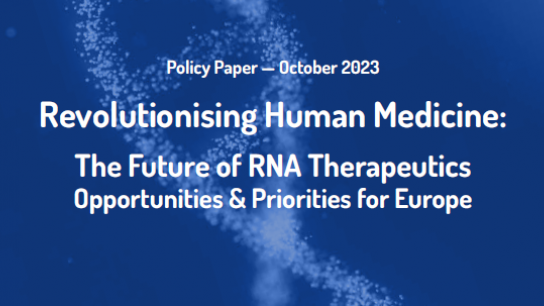New Policy Paper: EU Projects EXPERT and B-SMART Advocate for More Research Efforts to Unlock the Potential of RNA Therapeutics
In recent years, messenger RNA (mRNA) has gained global recognition, largely due to its pivotal role in the development of COVID-19 vaccines. The significance of RNA technology for human health was further underscored by the recent awarding of the Nobel Prize in Physiology or Medicine in this field and the breakthroughs made by company BioNTech in the quest to develop an RNA-based cancer vaccine. However, the potential applications of RNA therapeutics extend far beyond these achievements. A new policy paper, just released by the consortia of two EU Horizon2020 projects, B-SMART and EXPERT, delves into the possibilities of RNA-based nanomedicines and calls for increased efforts directed towards RNA research.
Researchers in the B-SMART and EXPERT projects are at the forefront of research into RNA-based nanomedicines. While research in the B-SMART project, which concluded in 2022, focussed on combating pervasive neurodegenerative illnesses, such as Alzheimer's, the current EXPERT project takes a closer look at cardiovascular diseases and at non-communicable diseases like cancer. For these research fields, advancing RNA therapeutics beyond its status quo has been essential and the potential for further areas of application is vast.
The joint B-SMART and EXPERT policy paper underscores the necessity for more targeted research schemes and additional funding to fully harness the potential of RNA-based therapeutics. The paper outlines opportunities, challenges, and recommends priorities to ensure Europe remains a global leader in this field, ultimately benefiting people and patients worldwide.
"As the coordinator of both B-SMART and EXPERT, I see a wealth of opportunities in RNA therapeutics. We, of course, acknowledge the challenges ahead, including technical hurdles and regulatory issues. But by increasing investment in RNA research, fostering academia-industry collaboration, and promoting education in this field, we can address these issues, and firmly keep Europe at the forefront of the RNA revolution," says Professor Raymond Schiffelers from the University Medical Centre Utrecht.
"Our ultimate hope is that by driving innovation in this field, we can translate these advancements into tangible benefits for people's health and wellbeing."
To read and download the policy paper, please visit our media section.
For any queries or comments regarding the policy paper, please contact Professor Raymond Schiffelers.
